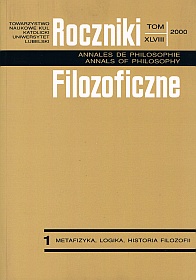There Must Be Something (In Reference to the Paper by Peter van Inwagen Why Is There Anything at All?)
Abstract
The article presents and discusses different answers to the modal version of the question „why is there anything at all?” :
(I) - thesis of necessity (E. G. Lowe): there must be something (it is impossible for there to be nothing);
(II) - thesis of maximal probability (P. van Inwagen): it is maximally probable for there to be something (it is as improbable as anything can be for there to be nothing);
(III) - nihilist hypothesis (T. Baldwin): there might be nothing (it is possible for there to be nothing).
Thesis (I) has two versions:
(A) there is a necessary being, i.e. a being which exists in all possible worlds;
(B) something esists in every possible world, i.e. each possible world is non-empty, though (A) is not true.
According to van Inwagen, there are two arguments for (A): the ontological and the cosmological argument. These arguments are formally correct, but we do not have an ultimate demonstration of their premises (the possibility of a necessary being and the Principle of Sufficient Reason). An argument for (B) is given by Lowe, but it requires a controversial account of universals and sets (for example a thesis that the empty set is „a purely fictional entity” ). The same problem concerns the „subtraction argument” for nihilist hypothesis (III) (formulated by Baldwin), which has three controversial ontological premises and assumes abstract conception of possibility. One must also reject the argument for (II) (constructed by van Inwagen). because its consequence claims that our world is as improbable as „the null (empty) world" (Baldwin) or „a world consisting purely of pink elephants floating in custard” (Lowe). In the final part of the paper I try to argue pragmatically (psychologically) that there must be something: our way of thinking is actualist and all possibilities are made of actual data.
References
Adams R. M., Theories of Actuality, [w:] The Possible and the Actual. Readings in the Metaphysics of Modality, ed. M. J. Loux, Ithaca: Cornell University Press 1979, s. 190-209.
Baldwin T.. There Might Be Nothing, „Analysis” , 56(1996), No. 4, s. 231-238.
Baldwin T.. Zwrot naturalistyczny, [w:] Filozofia brytyjska u schyłku XX wieku, pod red. P. Gutowskiego, T. Szubki, Lublin: TN KUL 1998, s. 393-414.
Bocheński J. M., Pięć dróg, tł. J. Miziński, [w:] tenże , Logika i filozofia. Wybór pism. Warszawa: Wydawnictwo Naukowe PWN 1993. s. 469-503.
Inwagen P. van. Metaphysics, San Francisco: Westview Press 1993.
Inwagen P. van. Dwa pojęcia światów możliwych, tł. T. Szubka, U. Żegleń, [w:] Metafizyka w filozofii analitycznej, pod red. T. Szubki. Lublin: TN KUL 1995, s, 177-215.
Inwagen P. van. Dlaczego w ogóle cokolwiek istnieje?, tł. I. Ziemiński, w niniejszym tomie, s. 37-53.
Jadacki J. J. (red.), Propedeutyka filozofii (Materiały pomocnicze), z. 1. Warszawa: WSiP 1982.
Krąpiec M. A., Metafizyka. Zarys teorii bytu, Lublin: RW KUL 19843.
Leibniz G. W.. Rozprawa metafizyczna, tł. S. Cichowicz, [w:] tenże , Główne pisma metafizyczne, Toruń: Comer 1995.
Lewis D., Światy możliwe, tł. U. Żegleń, [w:] Metafizyka w filozofii analitycznej, s. 127-135.
Lowe E. G., Why Is There Anything at All?, „Aristotelian Society Supplementary Volume", 70(1996) 1 I 1-120.
Massey G. J., Understanding Symbolic Logic, New York: Harper and Row 1970.
Parfit D., Why Anything? Why This?, „London Review of Books” : część I - 22 January 1998 (s. 24-27), część 1 1-5 February 1998 (s. 22-25).
Plantinga A. C., Bog, wolność i zło, tł. K. Gurba, Krakow: Znak 1995.
Rowe W. L., Cosmological Arguments, [w:] A Companion to Philosophy of Religion, ed. P. L. Quinen. Ch. Taliaferro, Oxford: Blackwell Publishers 1997. s. 331-337.
Stępień A. B.. Wstęp do filozofii, Lublin: TN KUL 19953.
Stępień A. B.. Metafizyka i ontologia. Dwa oblicza teorii bytu?, [w:] Zadania współczesnej metafizyki. Poznanie bytu czy ustalanie sensów?, pod. red. A. Maryniarczyka SDB, M. J. Gondek, Lublin: Polskie Towarzystwo Tomasza z Akwinu 1999, s. 101-106.
Strożewski W.. Z problematyki negacji, [w:] tenże,, Istnienie i sens. Kraków: Znak 1994, s. 373-395.
Ziemiński I. Argument z przygodności bytu na istnienie Boga. Próba analizy krytycznej. cz. 1. „Kwartalnik Filozoficzny” , 25(1997), z. I, s. 129-144.
Żegleń U. M., Modalność w logice i w filozofii. Podstawy ontyczne, Warszawa: Polskie Towarzystwo Semiotyczne 1990.
Copyright (c) 2000 Roczniki Filozoficzne

This work is licensed under a Creative Commons Attribution-NonCommercial-NoDerivatives 4.0 International License.





